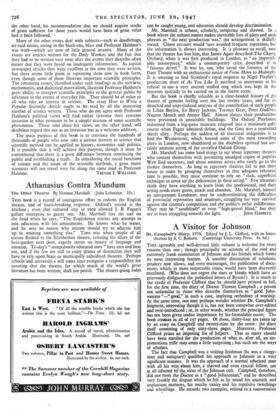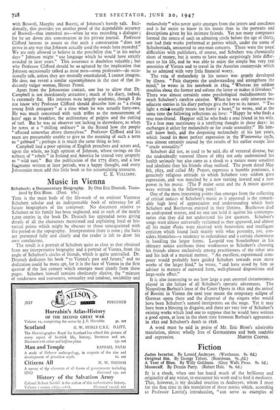A Visitor for Johnson
Tins agreeable and well-dressed little volume is welcome for more reasons than one ; though principally on account of the cool and extremely frank examination of Johnson and his friends which forms its most interesting feature. A sensible diminution of scholastic prudery now allows, and even encourages, the publication of docu- ments which, in more respectable times, would have been discreetly mutilated. (Who does not regret the stars or blanks which have so grievously disfigured the published letters of Byron?) It is much to the credit of Professor Clifford that he should have printed in full, for the first time, the diary of Doctor Thomas Campbell ; a person not unfamiliar to those who describe themselves as "good John- sonians "—" good," in such a case, implying orthodoxy of worship. At the same time, one may perhap; wonder whether Dr. Campbell's fragment, interesting though it is, has not been somewhat over-edited and over-introduced • or, in other words, whether the principal figure has not been given undue importance by his formidable escort. The book consists in all of 157 pages. Of these, thirty-four are taken up by an essay on Campbell and twenty-nine by the notes : the diary itself consisting of only sixty-three pages. Moreover, Professor Clifford prints an imposing list of helpers. That so many should have been enrolled for the production of what is, after all, an un- pretentious trifle may seem a little surprising ; but such are the ways of scholars.
The fact that Campbell was a visiting Irishman (he was a clergy- man and antiquary) qualified his approach to Johnson in a very significant manner. It was the approach of a normal educated man with all his wits about him, a shrewd and even cynical fellow, not at all infected 1;1 the virus of the Johnson cult. Campbell, therefore, did not meet the Doctor as a " good Johnsonian " and he described very frankly the disgust which he felt as he noted his uncouth and unpleasant manners, his touchy vanity and his repulsive twitchings and whistlings. He records two examples, related in a conversation
with Boswell, Murphy and Baretti, of Johnson's bawdy talk. Inci- dentally, this provides yet another proof of the dependable accuracy of Boswell—that immortal ass—when he was recording a dialogue ; for he set down this conversation in his private journal. Professor Clifford hastens to assure us that such a conversation " does not prove in any way that Johnson actually used the words here recorded." We are only allowed to believe in the possibility that " in his earlier days " Johnson might " use language which he would have strictly avoided in later years." This assurance is doubtless valuable ; but why Professor Clifford should be so agitated by the implication that Johnson occasionally talked as most men—even professors—do occa- sionally talk, unless they are mentally emastulated, I cannot imagine. He does not reveal a similar squeamishness in the case of that in- decently vulgar woman, Hester Piozzi.
Apart from the Johnsonian contact, one has to allow that Dr. Campbell is not inordinately attractive ' • much of his diary, indeed, is extremely flat. His interests were largely academic, though I do not know why Professor Clifford should describe him as " a rising young Irish antiquary " at a time when he was actually forty-two. He was much concerned with such trifles as the measurement of hens' eggs at breakfast, the architecture of pulpits and the cutting of turf. But he was an observer not lacking in shrewdness, as when he notes at a " shilling ordinary " in the Strand how the people "affected somewhat above themselves." Professor Clifford and his team are presumably unable to give us the meaning of such a term as " gabbard " ; perhaps it is much the same thing as hoy.
Campbell had a poor opinion of English preachers and actors and, upon the whole, no high opinion of Johnson, whose ravings on the subject of "rebels " in Ireland and America he treated very properly as " wild rant." But the publication of the 1775 diary, and a few fragments written at later periods, was a happy thought, and every Johnsonian must add this little book to his accumulating treasures.
C. E. VULLIAMY.



































 Previous page
Previous page